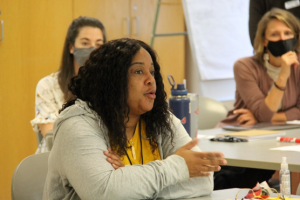MEDIA INVITED: Teachers from NC communities impacted by PFAS contamination to convene at UNC to create health-focused science lessons
June 14, 2022
Media invited
Eight high school science teachers from five North Carolina counties will convene at UNC June 20-22 to design lessons about an emerging environmental contaminant, per- and poly-fluoroalkyl substances (PFAS). First developed in the 1950s, PFAS are found in water-repellant fabrics, non-stick cookware, and a host of other products because they repel grease, oil, and water. And now they have also been detected in drinking water and outdoor air across the United States, including multiple sites in North Carolina, such as Wilmington, Greensboro, and Pittsboro.
Teachers from these locales are enrolled in UNC’s Iterative Design to Engage All (IDEA) Learners program. During the upcoming design institute, teachers will work alongside researchers, including graduate students, to co-create inclusive science lessons that will facilitate student learning about PFAS and human health. This program will build the capacity of NC’s science teachers to use an emerging environmental health issue (PFAS contamination of drinking water) to engage all learners and ultimately help cultivate a diverse biomedical workforce.
IDEA Learners is a five-year program sponsored by the Center for Environmental Health and Susceptibility in UNC’s Gillings School of Global Public Health, the UNC Institute for the Environment, the UNC School of Education and the NCSU College of Education. Funded by a $1.25 million Science Education Partnership Award from the National Institute of General Medical Sciences, this program will support 96 NC teachers in integrating PFAS research into instruction and inspiring the next generation of biomedical researchers.
“I am looking forward to designing lessons that engage students in the cutting-edge research that is currently being done across our state and that inspire them to be more civically engaged. I hope to see many of them consider careers in the biomedical field so they can be the ones solving critical issues like this in the future,” says Andromeda Crowell, a member of the design team from Orange High School in Hillsborough.
The design institute will take place at the Europa Center in Chapel Hill. On June 20, activities will take place from 10 a.m. to 5 p.m. and will include an informal conversation with NCSU’s Dr. Scott Belcher on wrangling alligators to study the health effects of PFAS, a report-out from one Wilmington science teacher who attended the 3rd National PFAS Conference, and a discussion about promoting diversity, equity, and inclusion in biomedical research careers with Kathleen Gray, director of CEHS’s Community Engagement Core, who also serves as one of the program’s principal investigators.
From 9:30 a.m. to 4:30 p.m. on June 21 and June 22, teachers Kelly Ryoo from UNC’s School of Education will guide teachers through the co-creation of standards-aligned lessons to introduce students to PFAS and relevant biomedical research careers. Teachers’ prototype lessons will be piloted during the 2022-2023 school year and eventually be available for use in high school classrooms across the state – helping teenagers to understand an emerging and relevant environmental issue while also promoting biomedical research careers.
Participating teachers include:
- Tabitha Batts-Turner (Hoke County High School, Hoke County)
- Andromeda Crowell (Orange High School, Orange County)
- Amy Elliott (Douglas Byrd High School, Cumberland County)
- Daniel Glaze (Grimsley Senior High School, Guilford County)
- Clare Matusevich (Chapel Hill High School, Orange County)
- Taryn Shelton (Cumberland County Schools)
- Abria Vodenichar (Bethany Community School, Guilford County)
- Matt Yaeger (Topsail High School, Pender County)
Members of the media interested in attending can obtain a detailed schedule of events by contacting Dana Haine, IDEA Learners Program Director, dhaine@unc.edu, (919) 843-5735 or Emily Williams, UNC Institute for the Environment Communications, emilywilliams@unc.edu, (919) 962-0965.
IDEA Learners is administered by the Center for Environmental Health and Susceptibility in UNC’s Gillings School of Global Public Health, with support from a $1.25 million Science Education Partnership Award (National Institute of General Medical Sciences, National Institutes of Health (Award Number R25GM142060-01)) in partnership with the UNC Institute for the Environment, the UNC School of Education and the NCSU College of Education.
Learn more: https://ie.unc.edu/cpes/idea-learners/

